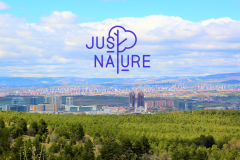
Activation of NATURE-based solutions for a JUST low carbon transition in cities
JUSTNature: Activation of NATURE-based solutions for a JUST low carbon transition
Cities consume more than three quarters of the world’s energy and produce more than 60 % of greenhouse gas (GHG) emissions. They have a high density of socio-economic activities and a built environment design that enhance these issues. In this regard, especially developed cities can be exemplars in leading the way towards a low-carbon society, and turning it into an opportunity as recently iterated by the European Green Deal.
Reversing this situation will turn cities into models, leading the way towards a low-carbon society. One way to do this is to ensure there is enough ecological space, for example regarding clean air, thermal comfort and biodiversity. However, this is often exclusive to high-income neighbourhoods.
The EU-funded JUSTNature project will turn to nature-based solutions to ensure a just transition to low carbon cities. Considering the right of all citizens to ecological space, the project will co-design new systems which conserve natural ecosystem values and functions and will ultimately provide numerous benefits to people.
In this regard, the overall objective of JUSTNature is the activation of nature-based solutions (NbS) by ensuring a just transition to low-carbon cities, based on the principle of the right to ecological space. This in particular refers to the right to clean air and indoor/outdoor thermal comfort for human health and well-being, as well as thriving biodiversity and ecosystems. It also refers to the duty of not constraining the ecological space of others, in particular in relation to the mitigation of climate change and measures required for reducing GHG emissions.
JUSTNature will contribute to this vision of shaping low-carbon cities by developing a set of typical Low carbon | High air quality NbS in seven European city practice labs. By activating their just implementation, it will drive the co-design, co-creation and co-decision of supporting interventions with regard to four innovation dimensions: 1) enabling effective governance, 2) enabling NbS system maintenance and operation, 3) enabling innovative business models and market design, and 4) enabling efficient technologies and applications.
Planetek role
Planetek will enable the exploitation of Earth Observation data and technology towards low-carbon cities, by providing access to useful insights to urban planners, such as mapping green space distribution in the CiPeLs to identify urban heat island hotspots, mapping the extent of tree cover and vegetation connectivity, and determining a first set of priority urban ecosystem conservation and restoration areas.
The seven European City Practice Labs are: Bolzano-Merano (Italy), Chania (Greece), Gzira (Malta), Leuven (Belgium), Munich (Germany) and Szombathely (Hungary).
Partners
EURAC (Pj Coordinator), Stadtgemeinde Merano, Landeshauptstadt Muenchen, Gzira Local Council, IES R&D, TUM, COBZ, Planetek Italia, University of Malta, Technical University of Crete, RWI, E2ARC, Crowdhelix Ltd, ABUD, Szombathely Megyei Jogu Varos Onkormanyzata, Inlecom Commercial Pathways company Ltd by guarantee, Prospex Institute, LEUVEN, Kydon Dimotiki A.E., Isocarp Institute.
This project has received funding from the European Union's Horizon 2020 research and innovation programme under grant agreement number 101003757. https://cordis.europa.eu/project/id/101003757
Programme: H2020-EU.3.5. - SOCIETAL CHALLENGES - Climate action, Environment, Resource Efficiency and Raw Materials. Topic: LC-CLA-11-2020 - Innovative nature-based solutions for carbon neutral cities and improved air quality.
Learn more on: https://justnatureproject.eu/
Project information
Client information:
EU H2020

